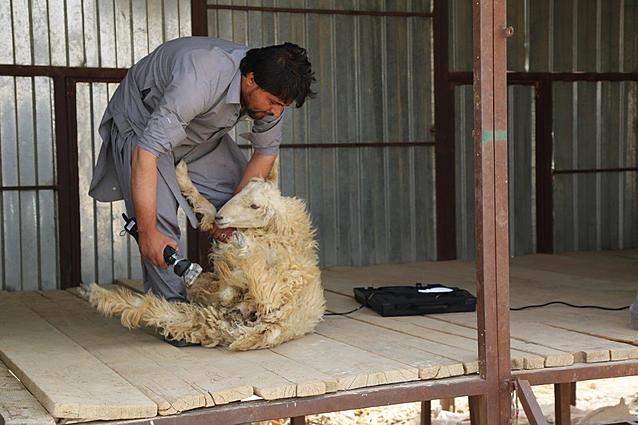
“Working as an auto mechanic, I was only able to earn PKR100 each day. Then there were also days when I was not making any money at all. I did not have any other skills which I could use to earn a living and support my family,” said 28-year-old Abdul Khaliq.
Life had not been easy for Abdul Khaliq who lived with his eight brothers and two sisters in the village of Saragurghai, Quetta District. The meagre sum he earned working as a mechanic was not enough to cover the basic needs of his family.
In 2012, Abdul Khaliq decided to enroll in a training on wool shearing organized by the Food and Agriculture Organization of the United Nations (FAO). Along with his friends, Khaliq was trained in wool shearing using modern techniques.
“I had seen the traditional methods used for wool shearing. The process was time consuming, and people often complained of wrist pain caused by spending long hours shearing wool by hand. It took several days to complete the process, and the targets set aside [in terms of the number of sheep to be sheared] were often not met. Slaughtering sheep from within the flock to serve meals to wool shearers was common practice–this significantly increased the cost,” said Khaliq.
After completing the training, Khaliq began working as a wool-shearer full-time and was able to earn a healthy profit. With the modern equipment he was provided towards the end of the training, Khaliq was able to shear 20- to 25 animals a day, earning a sum of PKR 50 per animal. The profits especially soared during the peak-seasons from March to April and from September to October when he sometimes made up to PKR 120 000 cumulatively.
Khaliq was keen on imparting the knowledge he had gained to other young men in the community, and thus, he decided to become a shearing trainer with FAO. As a trainer, he now teaches young men new effective techniques of wool shearing. The additional income of PKR 2 500 to 3 000 he generates each day as a trainer helps him provide for his family’s needs. “For many years, it was only my brother who brought back enough income to support the family. Today, I’m proud to say that I am also contributing financially to support my family. Our way of living has improved drastically. My elder brother’s children are now going to school,’ said Khaliq. “I want to provide a better future to my family and want them to succeed in life,” he added.
The Food and Agriculture Organization of the United Nations (FAO) under the AUS ABBA project supported by Australian Aid trained 10 206 people (5 184 men and 5 022 women) to receive various skills, including wool shearing. For the past few years, the wool industry has become an important source of income for rural communities of Balochistan. FAO trained farmers in modern practices of wool shearing and provided them with the necessary knowledge about wool washing and colouring which could help them produce yarn. Today, local women from rural communities who have been trained in carpet weaving produce carpets using recycled wool fibers from the wool shearing process. This saves them the cost of buying yarn from the local market. By encouraging people to use their existing resources through sustainable trainings, successful value chains are created where the trainees benefit from each other’s practices.
Under the Agri Business Programme funded by Australian aid, the project focuses on assisting agriculture-based households to adapt sustainable, profitable and diversified strategies to increase their income, food security and nutritional status. The project has helped connect male and female farmers to markets for specific commodities in Balochistan.
